BEIRUT -- Government warplanes pounded a rebel-held neighborhood in the central city of Homs on Sunday, killing at least three people and wounding dozens, Syrian opposition activists said, and President Bashar Assad's forces pushed ahead in Syria's offensive on the historic town of Palmyra that's held by the Islamic State group.
The Britain-based Syrian Observatory for Human Rights and pro-government media said troops were about 6 miles west of Palmyra, which is home to some of the world's most treasured archaeological sites.
The Islamic State overran the city, prized for its ancient Roman archaeological ruins, in December for a second time. In March of last year, government forces had captured the town, ending a 10-month rule by the extremists.
The Observatory said government forces and their allies now control hills that oversee three gas fields west of the town amid intense airstrikes. Syrian troops and their allies launched a wide offensive toward Palmyra in mid-January under the cover of Russian airstrikes.
The government-controlled Syrian Central Military Media confirmed that troops are now a few miles away from the town, which is home to the UNESCO heritage site for which Palmyra is famous and which has already sustained destruction at the hands of the Islamic State.
The Islamic State group has been under pressure in Iraq and Syria over the past months, and the Syrian forces' march toward Palmyra comes days after the extremists lost the northern town of al-Bab to Turkish troops and Turkey-backed opposition fighters. Iraqi forces are also on the offensive to capture the western part of the northern Iraqi city of Mosul.
Syrian Central Military Media said Syrian troops captured the town of Tadef on the southern edge of al-Bab, adding that experts were dismantling explosives and booby-traps left behind by the Islamic State extremists.
Palmyra is in the central province of Homs, where violence was reported Sunday in the provincial capital that carries the same name.
Meanwhile on Sunday, the United Nations envoy for Syria met with opposition representatives separately in Geneva, reflecting the groups' struggle to form a united front in peace talks with the Damascus government. Staffan de Mistura met first with representatives of the opposition delegation dubbed the Cairo platform.
After the meeting, Jihad Makdissi, at the helm of the Cairo delegations, said the envoy gave them papers on "how to facilitate talks" between the various opposition groups and the government.
Makdissi, a former spokesman for the Damascus government who left Syria in 2012, sought to downplay differences in the opposition, saying they were "diverse" rather than "fragmented," and could agree on technical rather than political points.
"We want to be one delegation, not a unified delegation," he told reporters.
Opposition activists said airstrikes on Homs' rebel-held neighborhood of al-Waer on Sunday came a day after the area was subjected to more than 40 air raids that killed and wounded dozens. The airstrikes appeared to be in retaliation for militant attacks in the city on Saturday that killed a senior security officer and at least 31 others.
The Observatory and the al-Waer-based activist Bebars al-Talawy said the airstrikes killed three people. "Today's escalation began in the early afternoon with repeated airstrikes," al-Talawy said via text messages from al-Waer.
The observatory said that, besides the airstrikes, al-Waer was being subjected to shelling.
The swift, high-profile attacks against the Military Intelligence and State Security offices were claimed by an al-Qaida-linked insurgent coalition known as the Levant Liberation Committee.
Separately, an Israeli health official said Israel's hospitals will stop treating Syrian patients in nonemergency cases beginning next week unless the Israeli government fully reimburses the hospitals for years of medical treatments to those wounded in the Syrian civil war.
The Health Ministry said that since 2013, four Israeli hospitals have treated a total of 2,278 Syrians. It said many of them had war wounds requiring significant surgery.
Israeli Prime Minister Benjamin Netanyahu said in December that he wanted to expand medical assistance to wounded Syrians.
But Orly Weinstein, who heads the Health Ministry's division of government medical centers, told the prime minister's office Sunday that the Israeli government has only partially reimbursed hospitals for the treatments and that the hospitals can no longer bear the financial burden.
Information for this article was contributed by Dominique Soguel of The Associated Press.
A Section on 02/27/2017

